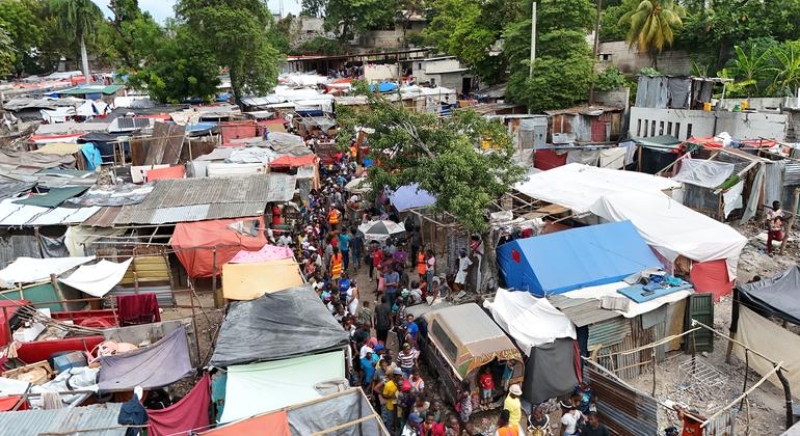- India Sees 9% Drop in Foreign Tourists as Bangladesh Visits Plunge |
- Dhaka Urges Restraint in Pakistan-Afghan War |
- Guterres Urges Action on Safe Migration Pact |
- OpenAI Raises $110B in Amazon-Led Funding |
- Puppet show enchants Children as Boi Mela comes alive on day 2 |
Gang Violence Displaces 1.3 Million People in Haiti

The number of spontaneous displacement sites continues to multiply across Haiti as more people flee violence and insecurity.
Nearly 1.3 million people have been forced to flee gang violence in Haiti and seek refuge elsewhere within the Caribbean country, the International Organization for Migration (IOM) said on Wednesday.
This represents a 24 percent increase since December 2024, according to the UN agency—the largest number of people displaced by violence on record in Haiti.
“Behind these numbers are so many individual people whose suffering is immeasurable—children, mothers, the elderly—many of them forced to flee their homes multiple times, often with nothing, and now living in conditions that are neither safe nor sustainable,” said Amy Pope, IOM Director General.
Existential Challenges
These figures were released just ahead of a meeting on Wednesday at UN Headquarters in New York, organized by the Economic and Social Council (ECOSOC) and the Peacebuilding Commission (PBC), to explore how peace and stability can return to the island nation following years of chaos and crisis.
The meeting focused on consolidating peace at the local level and reducing violence, particularly by involving women and youth in local initiatives.
At a press conference prior to the meeting, ECOSOC President Bob Rae stated that the current situation in Haiti was “truly existential.”
“It’s important that we have a meaningful discussion about what we can do together to address these problems,” he said, emphasizing that it’s “not just about increasing firepower.”
Joining via videoconference, the Special Representative of the Secretary-General for Haiti, María Isabel Salvador, also stressed that this is a “multifaceted crisis” requiring equally multifaceted and dynamic solutions.
“We believe that the international community’s response must match the scale, urgency, and complexity of the challenge. That’s why strong international security support must be accompanied by peacebuilding measures, humanitarian action, and political support to help Haiti progress toward sustainable development.”
According to her, one way to reduce violence is by empowering communities themselves—especially women and children—to lead bold new initiatives.
Violence Spreads
Haiti has experienced a resurgence of violence since mid-February. According to the IOM, while Port-au-Prince remains the epicenter of the crisis—with 85 percent of the city controlled by gangs—violence has intensified beyond the capital in recent months.
Recent attacks in the Centre and Artibonite departments have forced tens of thousands to flee, many now living in precarious conditions and temporary shelters.
“Although about a quarter of all internally displaced people still live in the capital, a growing number are fleeing to other parts of the country in search of safety,” the IOM said.
In the Artibonite department in western Haiti, over 92,000 people have been displaced, largely due to violence in Petite Rivière. In the Centre department, the situation is even more alarming, with 147,000 people displaced—double the number from recent months—due to fighting in towns like Mirebalais and Saut-d'Eau.
As displacement grows, the number of spontaneous displacement sites has also risen, from 142 in December to 246 now.
Around 83 percent of displaced people are staying with host families, putting a heavy strain on already overstretched households, especially in rural areas.
Pay Attention and Act
Armed violence continues to severely disrupt access to basic services, according to the UN humanitarian coordination office (OCHA), creating a deepening humanitarian crisis.
“We must act urgently. The strength of the Haitian people is impressive, but resilience cannot be their only refuge. This crisis cannot become the new normal,” said Ms. Pope.
The President of the General Assembly, Philémon Yang, addressed the ECOSOC meeting, urging the international community to adjust “not just our attention but our action” and to coordinate across the UN system to maximize impact.
“We must do our utmost to ensure that Haiti is not abandoned to a future of fear and despair but instead is embraced by a global commitment to peace, opportunity, and dignity,” he said.

